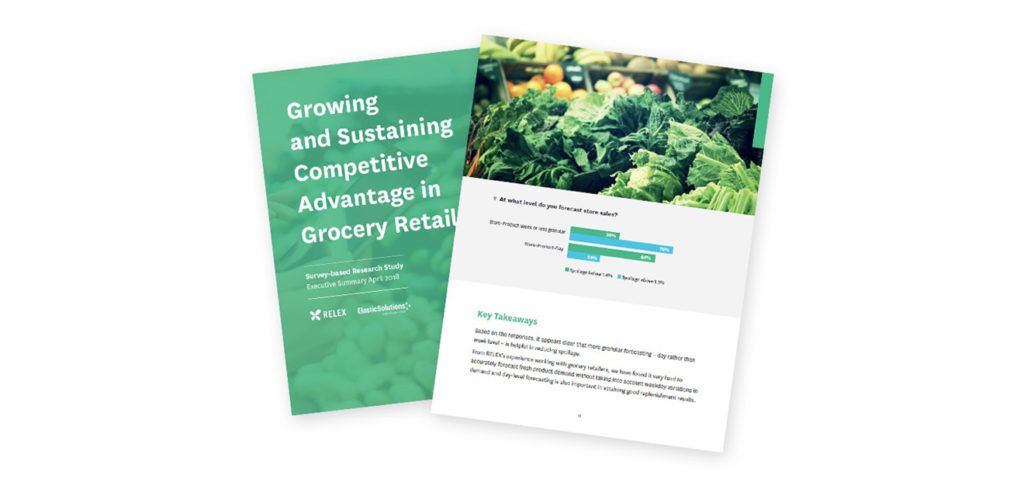RELEX Survey Reveals Opportunities for Grocers to Boost Operational Efficiency and Reduce Fresh Food Waste
May 9, 2018 • 3 minStudy shows more precise forecasting results directly in less food spoilage
In a new survey sponsored by RELEX Solutions, nearly three quarters of grocery retailers cited the market as more competitive than ever before and only 10% see new opportunities for growth opening up, adding that their top priority is improving operational efficiency. Titled Growing and Sustaining Competitive Advantage in Grocery Retail, the report shows that retailers should be focused on modernizing processes and technology to increase the accuracy of forecasts and lower the cost of fresh food waste.

Four-fifths of the companies participating in the survey replied that fresh products are “Very Important” to their businesses. The annual value of spoilage for these companies was on average $70 million and up to several hundred million dollars for the largest companies.
“Our experience is that grocery retailers typically attain spoilage reductions of 10% to 30% by implementing forecast-based automatic store replenishment,” explains Johanna Småros, co-founder of RELEX. “It’s surprising that one in five of the responding companies still haven’t started implementing any kind of replenishment automation in their stores and less than one-third have managed to implement forecast-based automated store replenishment extensively, so there’s a lot of money still on the table.”
Other Key Findings
- 91% of responding companies that offer an online shopping channel are picking online orders in store for fulfillment.
- 69% of responding companies operating both brick & mortar and online channels do not produce separate forecasts by channel.
- 69% would like their forecasting systems to better predict promotional uplift.
- 53% are interested in the automated replenishment of ingredients which is consistent with the growing demand for food-to-go and meal kits.
- 50% are interested in their store replenishment planning becoming more space aware through considering planograms.
The survey results also show that attaining good replenishment results requires granular, i.e. day-level or even intraday forecasting, in combination with advanced replenishment calculations. Investing in a forecasting and replenishment system allows grocery retailers to address weekday related variation in demand and take richer data on promotions, as well as weather effects, into account.
Most respondents found budgetary issues, investments being tied up in other projects and fear of the complexity of implementation as the main reasons why they are not investing in improved retail and supply chain planning systems. “We have found that today’s best-of-breed systems minimize budget issues and complexity worries through SaaS deployments and flexible integration, so a new system no longer has to mean lengthy contracts and large up-front payments,” said Småros.
Study Overview
Between December 2017 and March 2018, RELEX and Elastic Solutions invited supply chain and merchandising executives from the top grocery retailers in North America to participate in the study. Over 60 grocery retail executives participated in the study. Four-fifths of the respondents were Directors, Vice Presidents or higher at their respective organizations. More than one-third of the participating companies had sales of over $5 billion.
RELEX Solutions along with Grocery Business is hosting a webinar on May 23rd at 11:30am ET to review the results and what grocery retailers can do now in order to grow and sustain a competitive advantage in today’s dynamic market. Register today!